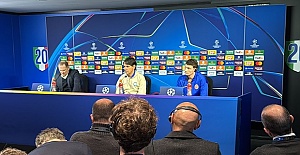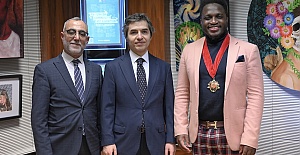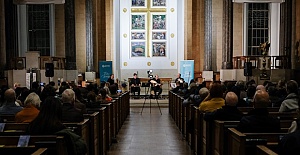VATAN OZ/LONDON-Nielsen Sports study highlights tournament’s highly positive economic and social impact on host country and host cities
According to a holistic study conducted by Nielsen Sports, the world’s leading provider of sports data measurement and fan insight, the economic impact of UEFA EURO 2024 for Germany and the ten host cities amounts to €7.4bn.More than 90% of this sum, was the direct result of expenditure by the 2.7 million ticket holders (44% from abroad), organisers and accredited persons as well as the resulting indirect and induced economic effects. The most significant expenses included accommodation, travel to and within the host cities, and food and beverages outside and inside the stadiums. The study also found that almost two-thirds of ticket holders used public transport within the host cities.
A total of €571m in advertising value was generated for the host cities and the host country combined, thanks to their presence and visibility in the global media.
UEFA president Aleksander Čeferin said: "UEFA EURO 2024 in Germany was an outstanding tournament and an unforgettable experience for everyone involved. The football was exceptional, the fans were delighted, and as this report clearly demonstrates, the tournament had a significant economic and social impact on the host country. This proves that major sporting events are not just a triumph for the football community but for society as a whole. As reflected in our motto - football unites people. We can already look ahead with excitement to UEFA EURO 2028 in the United Kingdom and Republic of Ireland, as well as UEFA EURO 2032 in Italy and Türkiye."

Bernd Neuendorf, president of the German Football Federation (DFB), said: "The study provides impressive evidence that UEFA EURO 2024 has had a wide range of positive effects across the ten venues and the country as a whole. Not only did it provide us with great matches and a fantastic atmosphere in the stadiums; it was also an economic and social success. Thirty-six years after EURO 1988 and 34 years after peaceful reunification, Germany has proven to be a football-loving country, a friendly host and a reliable partner for the organisation of major sporting events.”
Nancy Faeser, German federal minister of the interior and community, said: "We truly turned the European football championship into our “Heimspiel für Europa”, making it a summer of sport in the heart of Europe. I’m very pleased at the study’s findings: an economic impact of 7.4 billion euros in Germany exceeds expectations for hosting the tournament in Germany. And I’m especially happy that the economic, social and media impact of the tournament is directly benefitting the host cities. This wonderful tournament would not have been possible without the excellent organisational work and passionate dedication of our host cities.”
The conclusions of the study demonstrate the tournament’s positive impact in several areas:
The 51 matches were attended by 2.7 million spectators. 1.7 million were unique ticket holders, who attended at least one match.
On average, 23% of ticket holders came from the host cities, 33% from the rest of Germany and 44% from abroad.
97% of international ticket holders said they wanted to visit Germany again. On average, 79% of ticket holders said they would recommend visiting the city that had hosted their match.
78% of all ticket holders rated UEFA EURO 2024 as positive, implying positive associations with the host cities and host country by extension.
85% of host city residents said they were proud of hosting EURO 2024.
73% said that EURO 2024 had made a positive contribution to the common good and cohesion in the host city.
More than a quarter of residents said that they had been inspired by EURO 2024 and played more than two hours more sport than before.

UEFA and the DFB made special efforts in the area of sustainability, from the successful bid to host EURO 2024 onwards. Sustainability concepts were integrated into the bid and converted into an environmental, social and governance (ESG) strategy for the tournament, backed by targeted measures and investments totalling €32m. In relation to the environment, this encompassed areas such as climate protection, sustainable infrastructure and the circular economy. A comprehensive assessment of all work in the field of sustainability will be published as part of a comprehensive ESG report in autumn 2024.
The Nielsen Sports study was based on surveys of ticket holders, cross-media monitoring and evaluation of data from the host country, host cities and UEFA, as well as additional expertise and knowledge from over 150 similar impact studies successfully conducted by Nielsen Sports. The full report, which includes explanations of the approach and methodology used, can be found here.
A UEFA EURO 2024 tournament summary has also been published, providing more information about the sporting and operational aspects of the tournament and its global reach.UEFA EURO 2024 took place across ten host cities in Germany from 14 June to 14 July 2024. Spain were crowned European champions for a record-breaking fourth time after a 2-1 victory over England in Berlin's Olympiastadion.


 After Nesil Caliskan a by-election will be held in Jubilee ward in Enfield
After Nesil Caliskan a by-election will be held in Jubilee ward in Enfield Publishing the analysis, Labour’s Cllr Ergin Erbil said Everybody in Enfield deserves basic rights
Publishing the analysis, Labour’s Cllr Ergin Erbil said Everybody in Enfield deserves basic rights Gaza-Israel conflict Statement from Cllr Ergin Erbil, Leader of Enfield Council
Gaza-Israel conflict Statement from Cllr Ergin Erbil, Leader of Enfield Council Cllr Ergin Erbil was elected as the new Leader of Enfield Council
Cllr Ergin Erbil was elected as the new Leader of Enfield Council The European Union called on Turkey to uphold democratic values
The European Union called on Turkey to uphold democratic values Turkish citizens in London said Rights, Law, Justice
Turkish citizens in London said Rights, Law, Justice The Council of Turkish Cypriot Associations Geneva response letter
The Council of Turkish Cypriot Associations Geneva response letter Sustainable Development and ESG, Will This Become the Course for Turkic World
Sustainable Development and ESG, Will This Become the Course for Turkic World Saran Media And Euroleague Basketball Extend Media Rights Partnership for Four More Years
Saran Media And Euroleague Basketball Extend Media Rights Partnership for Four More Years Will Rangers be Jose Mourinho’s next victim?
Will Rangers be Jose Mourinho’s next victim? Jose Mourinho's Fenerbahce face Rangers on Thursday
Jose Mourinho's Fenerbahce face Rangers on Thursday Inzaghi stated that they felt the absence of our national player Hakan Çalhanoğlu
Inzaghi stated that they felt the absence of our national player Hakan Çalhanoğlu Barclays has become the biggest UK lender so far to cut mortgage rates
Barclays has become the biggest UK lender so far to cut mortgage rates THE SPRING STATEMENT EXPLAINED, UK ECONOMIC OUTLOOK AND GROWTH FORECASTS
THE SPRING STATEMENT EXPLAINED, UK ECONOMIC OUTLOOK AND GROWTH FORECASTS Launch of Made in Enfield gift shop to celebrate local artists and designers
Launch of Made in Enfield gift shop to celebrate local artists and designers Trial used smart Wi-Fi sensors for live building occupancy data to optimise
Trial used smart Wi-Fi sensors for live building occupancy data to optimise
















